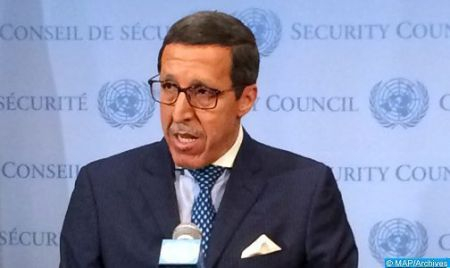Anniversary of Abraham Accords: Ambassador Hilale Reaffirms Morocco’s Unwavering Commitment to Peace, Security and Prosperity in Middle East
Permanent Representative of Morocco to the United Nations, ambassador Omar Hilale, pleaded Monday in New York, on the occasion of the first anniversary of the Abraham Accords, for a lasting peace in the Middle East, as a “strategic objective” to serve the present and future generations. “Our region is tired of war. Our region has suffered from all kinds of extremism, terrorism and rejection of the other. Our region needs real and warm peace. We need peace in our hearts and minds. We need peace as a strategic goal and as a horizon for us and also for future generations,” Hilale said in an address at a ceremony held at the Museum of Jewish Heritage in Manhattan, with the participation of ambassadors, permanent representatives to the United Nations of Israel, the United States, the United Arab Emirates and Bahrain. On this occasion, Hilale reaffirmed Morocco’s long-standing commitment and unwavering commitment to peace, security and prosperity in the Middle East. “For the Kingdom of Morocco, this joyful celebration is a commitment to strengthen and expand the ties fostered by these historic Accords, and to accelerate the positive transformation of the region, to increase stability, security and prosperity for us and for future generations,” Hilale stressed. The recent official visit of the Israeli Minister of Foreign Affairs, Yair Lapid, on August 12, in the Kingdom, marked by the signing of a series of cooperation agreements, reflect “the commitment of Morocco and Israel to strengthen their bilateral relations and give them a concrete impetus through the establishment of flexible and effective cooperation mechanisms,” said ambassador Hilale. “Today, we are reaping the benefits of the positive momentum in our relations since the signing last December of the tripartite agreement between Morocco, the United States and Israel, which led to the establishment of five working groups covering promising sectors, such as research and innovation, tourism, aviation, agriculture, energy, environment, trade and investment,” noted Hilale. The diplomat recalled that “above all, our relationship draws its strength from the long-standing attachment of the Jewish community of Moroccan origin to the Kingdom and the unbreakable ties between this community and the Sovereign, His Majesty King Mohammed VI, Commander of the Faithful, and protector of Moroccans of all confessions and beliefs”. “Through its long tradition of religious and spiritual tolerance, where coexistence between religions has been a reality for more than 12 centuries, and under the farsighted leadership of His Majesty King Mohammed VI, Morocco will continue to provide a space for coexistence and human interaction to promote peace in the world,” Hilale stressed. For his part, the Israeli ambassador to the UN, Gilad Erdan, said that the Abraham Accords are “the best illustration of the practice of tolerance and living together in peace with our neighbors”. “After presenting a vision of coexistence, peace and prosperity, our nations quickly began to translate words into action,” Erdan said, noting that in addition to opening diplomatic representations, the Abraham Accords countries have signed dozens of memoranda of understanding in various areas of cooperation. “These steps are crucial to laying the foundation for meaningful long-term relationships,” he said. For her part, the U.S. ambassador to the UN, Linda Thomas-Greenfield, noted that in the space of a year, concrete progress has been made through the Abraham Accords, assuring that the Biden administration “clearly wants to build on this model and replicate its success”. “The United States is committed to strengthening and expanding these Accords,” she said. In the same vein, ambassador Lana Zaki Nusseibeh, Permanent Representative of the United Arab Emirates to the UN, said that “as the world continues to emerge from the pandemic, the ties between all of our countries will continue to grow and deepen in a way that benefits not only the people of our countries, but the entire Middle East”. “As we face the Covid-19 pandemic, we must put aside our differences and work together in a spirit of mutual respect and trust to overcome our common challenges,” said Bahraini ambassador Jamal Al Rowaiei.

